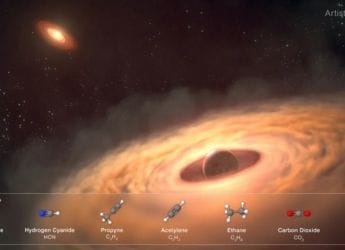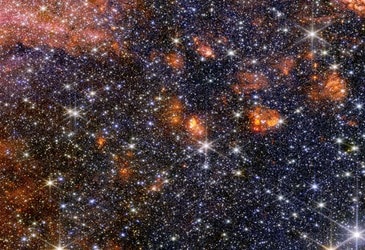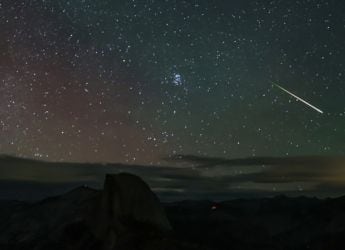- Home
- Science
- Science News
- Scientists Discover 63 Young Asteroid Families, Doubling Previous Record in Solar System
Scientists Discover 63 Young Asteroid Families, Doubling Previous Record in Solar System
Astronomers identified 63 new young asteroid families, doubling the known number to 106.

Photo Credit: Nature.com
Astronomers identified 63 new young asteroid families, doubling the known number in the solar system.
Scientists have identified 63 new young asteroid families, more than doubling the previously known number within our solar system. Less than 10 million years ago, these groups formed, emerging as larger asteroids or comets collided and fragmented into smaller bodies, and they shared similar orbital paths. Only 43 such families had been documented, till now; however, the new study mentioned that the total to 106. The findings facilitate a deeper insight into how asteroid groups evolve. Moreover, this can enhance comprehension of both meteorite origins and potential impact risks for Earth.
Discovery of 63 Young Asteroid Families Reshapes Our Understanding of the Solar System
According to a study published in Icarus, the team evaluated a catalogue of 1.25 million asteroid orbits by using a five-dimensional Hierarchical Clustering Method. Across the past 10 million years, by examining clustering in orbital elements, such as semimajor axis, eccentricity, inclination, and angular positions, researchers traced out these families sharing common orbital histories. The analysis also revealed that most of these families are young, less than one million years old, and consist of only three to ten members.
Experts noted that the largest identified family contained 58 members, while most groups were faint and near the limits of telescope detection. The authors explained that the observed members may represent only the “tip of the iceberg”, suggesting that future observations could uncover many more. In addition, about 54% of the new, smaller asteroid families formed from fragmentation were found within older, larger families.
The study torch towards the new asteroid families that are predominantly stony S-type, composed of silicates and nickel-iron. This also indicates a wider range of formation events and a more complex asteroid belt composition.
Researchers identified young asteroid families that reveal a dynamic history of collisions. This refines models of solar system evolution and improves future asteroid impact.
For the latest tech news and reviews, follow Gadgets 360 on X, Facebook, WhatsApp, Threads and Google News. For the latest videos on gadgets and tech, subscribe to our YouTube channel. If you want to know everything about top influencers, follow our in-house Who'sThat360 on Instagram and YouTube.
Related Stories
- Samsung Galaxy Unpacked 2025
- ChatGPT
- Redmi Note 14 Pro+
- iPhone 16
- Apple Vision Pro
- Oneplus 12
- OnePlus Nord CE 3 Lite 5G
- iPhone 13
- Xiaomi 14 Pro
- Oppo Find N3
- Tecno Spark Go (2023)
- Realme V30
- Best Phones Under 25000
- Samsung Galaxy S24 Series
- Cryptocurrency
- iQoo 12
- Samsung Galaxy S24 Ultra
- Giottus
- Samsung Galaxy Z Flip 5
- Apple 'Scary Fast'
- Housefull 5
- GoPro Hero 12 Black Review
- Invincible Season 2
- JioGlass
- HD Ready TV
- Laptop Under 50000
- Smartwatch Under 10000
- Latest Mobile Phones
- Compare Phones
- Realme 15x 5G
- OPPO A6 5G
- Samsung Galaxy M07
- Xiaomi 17
- Xiaomi 17 Pro Max
- Xiaomi 17 Pro
- Xiaomi 15T Pro
- Xiaomi 15T
- Asus Vivobook S16 (S3607QA)
- Gigabyte AORUS Master 16
- Samsung Galaxy Tab A11+
- Xiaomi Pad 8
- Xiaomi Smart Band 10 Glimmer Edition
- Xiaomi Watch S4 41mm
- Xiaomi Xiaomi TV S Pro Mini LED 55 2026
- Xiaomi TV S Pro Mini LED 65 2026
- Asus ROG Ally
- Nintendo Switch Lite
- Haier 1.6 Ton 5 Star Inverter Split AC (HSU19G-MZAID5BN-INV)
- Haier 1.6 Ton 5 Star Inverter Split AC (HSU19G-MZAIM5BN-INV)

















